Postpartum Foot Pain: Symptoms, Causes and Treatment
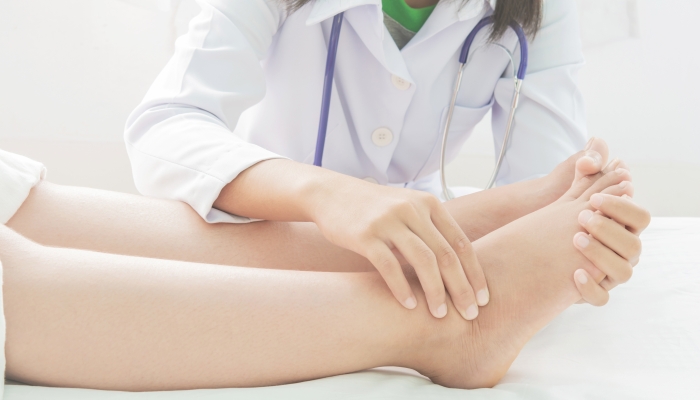
- Postpartum foot pain is caused by ligaments in your feet being overstretched and retention of water.
- Postpartum foot pain can last for up to 8 months without proper treatment.
- You can prevent postpartum foot pain by massaging your feet and wearing supportive shoes during pregnancy.
- Massage, stretching, special foot splints, and anti-inflammatory medication can all improve postpartum foot pain.
Low back pain, swollen ankles, and uncomfortable sleep are all well known side effects of pregnancy. Many women are surprised to find that along with their changing bellies, their feet change during pregnancy.
As your belly grows and your regular walk becomes a waddle, you might notice that your feet get more tired and sore. Your feet also change a lot during pregnancy, and some women have to go up a shoe size when they have a baby. These changes are due to a hormone called elastin. Elastin loosens up your ligaments to create more space between your bones and make room for your baby to grow and eventually come out through your pelvis.
Many pregnant and postpartum women experience arch and ankle pain that can last for months after delivery. This foot pain requires proper treatment.
But first, you’ll need to be able to tell the difference between regular tired feet and something more serious. Use this guide to learn more about postpartum foot pain, including the symptoms, causes, and treatment options.
What is Postpartum Foot Pain?
Postpartum foot pain is more than just being tired from carrying your baby. It’s actually a problem caused by loose ligaments in the foot, leading to unstable arches and pain that can make it difficult to walk. Tight calf muscles can also cause arch pain and ankle strain.
Foot pain after giving birth
Arch pain is common after giving birth. During pregnancy, you gain weight and your stride changes. This puts increased stress on your feet and can cause your arches to collapse in. Pregnant women also retain water, and a lot of the extra water ends up getting stored in the feet. This extra water can be uncomfortable or even painful.
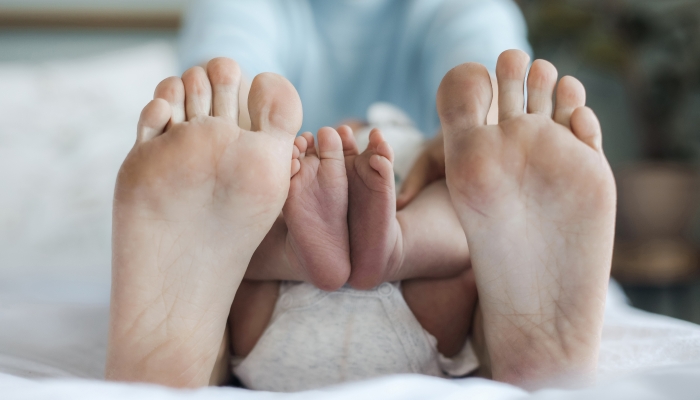
Why Are Your Feet Hurting After Giving Birth?
During pregnancy, you probably expected to be somewhat uncomfortable. You may be surprised if your feet continue hurting for weeks or even months after you deliver your new baby. The most common cause of postpartum pain in your arches and heels is plantar fasciitis.
Postpartum fasciitis
Postpartum plantar fasciitis is inflammation of the connective ligament between the toes and the heel. Plantar fasciitis is common in long distance runners as well as postpartum moms. Roughly 10% of the population will experience this inflammation at some time in their lives.
Signs of plantar fasciitis include pain on the bottom of the heel and along the arch of the foot. Plantar fasciitis is usually worse in the mornings or after long periods of rest. Your favorite shoes might make plantar fasciitis worse.
How Long Does Postpartum Foot Pain Last?
Without treatment, postpartum foot pain can last as long as 18 months. It’s important to consult your healthcare provider right away if you start to have foot pain.
You don’t want to be dealing with foot pain while caring for a newborn or chasing a toddler around the house. With the proper treatment, foot pain after delivery can resolve in just a few weeks.
How to Take Care of Your Feet After Giving Birth
Just like choosing supportive underwear after giving birth or comfortable nursing bras, wearing the right kinds of socks and shoes can make a big difference in how you will feel after delivery. Preventing sore postpartum feet is better than having to fix a problem later.
Compression socks can be worn after delivery to increase blood flow in your feet and reduce swelling. Wearing compression socks is especially important if you spend long hours standing or walking.
Being mindful of the shoes you wear is another way to take care of your feet after you deliver your baby. High heeled shoes are known for making plantar fasciitis worse. Running stores can help you find supportive shoes or inserts to fit your needs.
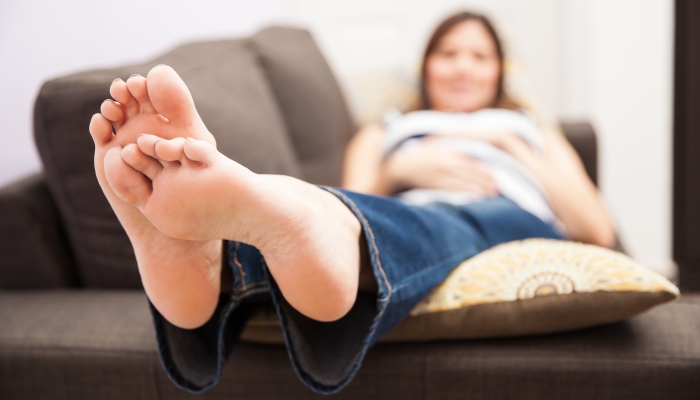
How to Help Get Rid of Postpartum Foot Pain
Because pregnancy loosens the ligaments in your whole body, some people will suffer with postpartum foot pain even if they wear shoes that offer support and compression socks. If you do end up with foot pain, there are several things you can do.
Physical therapy
One of the best things you can do for postpartum foot pain is physical therapy. While visiting a professional healthcare provider is the best option, there are many things you can do at home to soothe your aching feet.
Gentle stretching is great for loosening up the tissue on the bottom of your feet. While sitting down, you can wrap a towel or exercise band around the top of your foot and pull your toes gently towards you. This will stretch the connective tissue between your toes and your heel.
You can also gently massage the arches of your feet using a tennis ball or frozen water bottle. Simply sit somewhere comfortable and put the ball or water bottle under your foot and roll it back-and-forth. Massaging your calf muscles will also loosen up your feet.
Foods and medication
Since postpartum foot pain is due to inflammation and tightness at the bottom of your foot, using anti-inflammatory medication and food can help with your pain. Medications like ibuprofen are generally safe for postpartum moms, but be sure to talk to your healthcare provider before taking any medication.
Anti-inflammatory foods might also help you feel better. These foods include dark leafy vegetables, berries, and tomatoes.
Socks or splints
Most postpartum foot pain is worse in the morning or after a long period of rest. This is because while you are sleeping, your toes point slightly downward and the arch of your foot tightens up. Wearing special splints at night to keep your toes pointed upward gently stretches the arch of your foot through the night.
The splints can be found at most drug stores or online. If your arch or ankle pain is severe, you may need custom orthotics to heal plantar fasciitis and support the muscles in your feet.
FAQs
Do your feet go back to the same size after pregnancy?
Some women report needing to go up a full shoe size during pregnancy. Some part of this may be due to swelling, some of it is due to structural changes in your muscles and bones. The swelling in your feet should resolve, but your bones may never return to where they were prior to pregnancy.
When can you start running after giving birth?
Most healthcare providers recommend only light activity for the first six weeks after you deliver your baby. This is especially important if you have had a C-section delivery or any other complications like preeclampsia.
Start with light walking a few days after delivery and slowly progress to a light jog by six weeks. Always make sure to wear supportive shoes and get clearance from your doctor before starting any exercise program.
When should I call a doctor about foot swelling?
While swollen lower extremities during pregnancy are to be expected, be aware of any sudden changes or painful swelling in your feet. If you notice an increase of swelling in only one foot, or if the swelling is painful, call your doctor right away. Swelling in only one foot could be a sign of a blood clot.
In addition, if you notice rapid swelling in your feet, you should make an appointment with your medical provider right away. Mild water retention over time is normal, but sudden swelling is a reason to be concerned.
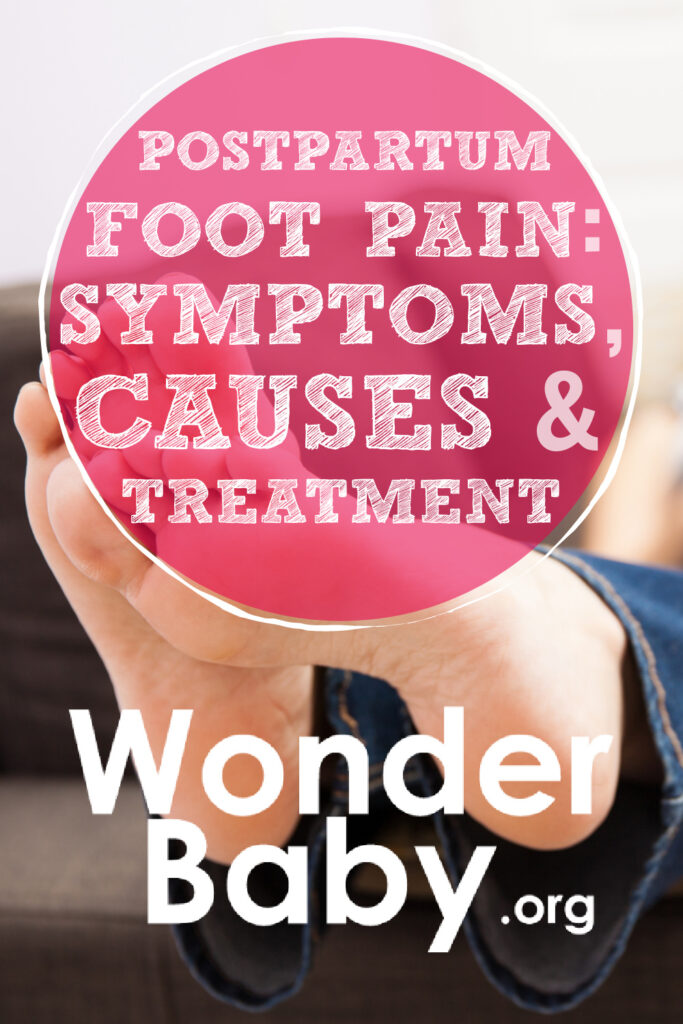
The information WonderBaby provides is not intended to be, and does not constitute, medical or other health advice or diagnosis and should not be used as such. Always consult with a qualified medical professional about your specific circumstances.
Related Posts
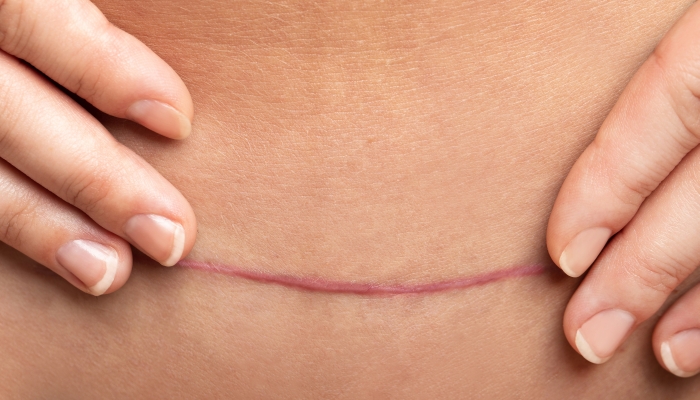
Pregnancy
How To Deal With an Ingrown Hair on a C-Section Scar
Ingrown hairs on a C-section scar can be treated using a warm compress or mild exfoliation. Infected ingrown hairs may require antibiotic treatment.
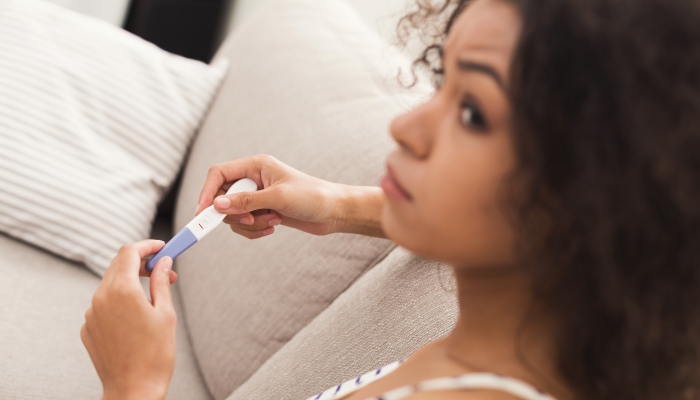
Pregnancy
What’s a Dye Stealer Pregnancy Test?
A dye stealer pregnancy test usually means that your hCG levels are very high, which is typically considered a good sign for pregnancy.
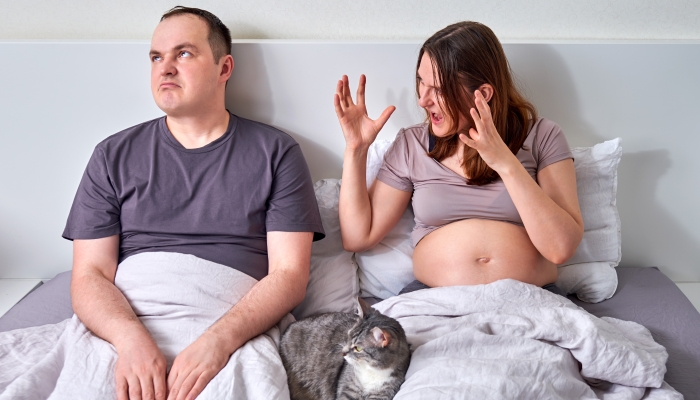
Pregnancy
Can Yelling Cause a Miscarriage?
Yelling alone can not cause a miscarriage. However, maternal stress can cause high blood pressure, preterm labor, and other health problems.